She could get no further, for the very idea was overwhelming, and sinking down beside Hugh’s mother, she laid her head on her lap, and wept bitterly. Alas, that scenes like this should be so common in our once happy land, but so it is. Mothers start with terror and grow faint over the boy just enlisted for the war; then follow him with prayers and yearning love to the distant battlefield; then wait and watch for tidings from him; and then too often read with streaming eyes and hearts swelling with agony, the fatal message which says their boy is dead.
It was a sad day at Spring Bank when first the news of Hugh’s enlistment came, sadder even than when ’Lina died, for Hugh seemed as really dead as if they all had heard the hissing shell or whizzing ball which was to bear his young life away. It was nearly two months since he left home, and he could find no trace of Adah, though searching faithfully for her, in conjunction with Murdock and Dr. Richards, both of whom had joined him in New York.
“If Murdock cannot find her,” he wrote, “I am convinced no one can, and I leave the matter now to him, feeling that another duty calls me, the duty of fighting for my country.”
It was just after the disastrous battle of Bull Run, when people were wild with excitement, and Hugh was thus borne with the tide, until at last he found himself enrolled as a private in a regiment of cavalry gathering in one of the Northern States. There had been an instant’s hesitation, a clinging of the heart to the dear old home at Spring Bank, where his mother and Alice were; a thought of Irving Stanley, and then, with an eagerness which made his whole frame tremble, he had seized the pen and written down his name, amid deafening cheers for the brave Kentuckian. This done, there was no turning back; nor did he desire it. It seemed as if he were made for war, so eagerly he longed to join the fray. Only one thing was wanting, and that was Rocket. He had tried the “Yankee horses,” as he called them, but found them far inferior to his pet. Rocket he must have, and in his letter to his mother he made arrangements for her to send him northward by a Versailles merchant, who, he knew, was coming to New York.
Hugh and Rocket, they would make a splendid match, and so Alice thought, as, on the day when Rocket was led away, she stood with her arms around his graceful neck, whispering to him the words of love she would fain have sent his master. She had recovered from the first shock of Hugh’s enlistment. She could think of him now calmly as a soldier; could pray that God would keep him, and even feel a throb of pride that one who had lived so many years in Kentucky, then poising almost equally in the scale, should come out so bravely for the right, though by that act he called down curses on his head from those at home who favored rebellion, and who, if they fought at all, would cast in their lot with the seceding States. She had written to Hugh a kind, sisterly letter, telling him how proud she was of him, and how her sympathy and prayers would follow him everywhere. “And if,” she had added, in concluding, “you are sick, or wounded, I will come to you as a sister might do. I will find you wherever you are.”




